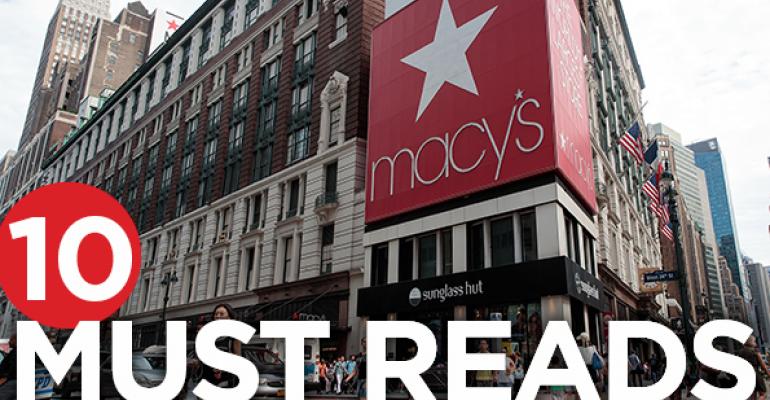- Wall St. Banks Ask Fed for Five More Years to Comply with Volcker Rule “Big Wall Street banks are asking the U.S. Federal Reserve to grant them an additional five-year grace period to comply with a financial reform regulation known as the Volcker rule, people familiar with the matter said. If the Fed agrees, the extension would give banks more time to exit fund investments that are difficult to sell, but no longer allowed by the law. The added grace period, which follows three one-year extensions, would start next year and run through 2022.” (Reuters)
- 9 Cities That Can’t Seem to Recover from the Housing Crisis “Thousands of homeowners are being left behind by the housing market recovery. In nine cities in the U.S., more than one in five homeowners owns a home that is seriously underwater (compared with only about one in 10 across the nation) — and few who live in those markets have built up a lot of equity. ‘Those are markets that have been left behind,’ says Daren Blomquist, vice president at real-estate research firm ATTOM Data Solutions.” (MarketWatch)
- Why Shutters Are Coming Down at Macy’s “The moves represent a dramatic shift for the retailer, which has for years been weighing potential strategies for monetizing its real estate. They are an important defensive step as it tries to prevent itself from being further squeezed between Amazon.com and discounters such as TJX Cos. Shares rose 18% Thursday afternoon. They remain down by 40% over the past year. The urgency of the situation has become increasingly clear for Macy’s as same-store sales have fallen for six consecutive quarters.” (Wall Street Journal)
- City Launches Loan Program for Budding Developers “Financial assistance is on the way for smaller developers. The city launched a new low-interest loan program that will help builders acquire sites and prepare new residential, commercial or industrial projects for construction, the city Economic Development Corp. announced Thursday. The program, called the Emerging Developer Loan Fund, will be run by a partnership between the city and a subsidary of Basis Investment Group, a Manhattan-based lender.” (Crain’s New York Business)
- REIT Stocks Rocked by Store Closure Fears “Shares of real-estate investment trusts were broadly lower Thursday, as investors viewed Macy’s Inc.’s plan to close about 15% of its full-line stores as a threat to mall operators. The iShares U.S. Real Estate exchange-traded fund IYR, slumped 1.2% in afternoon trade, with 100 of its 117 equity components losing ground. That contrasts with the 0.6% surge into record territory by the S&P 500 index SPX, which had about three-quarters of its components trading higher.” (MarketWatch)
- Clarion Partners Severs Ties with Boston Office Assets “For $100.5 million, John Hancock Real Estate has bought the two interconnected 13-story office buildings at 535-545 Boylston St., in Boston’s Back Bay area, John Hancock announced Tuesday. The buildings total 184,000 square feet and are home to a diversified roster of tenants. The acquisition, according to John Hancock, builds on its commitment to Boston and the Back Bay, where the company currently owns 197 Clarendon and 200 Berkeley and recently announced a $350 million redevelopment at 380 Stuart St.” (Commercial Property Executive)
- Housing Official in Silicon Valley Resigns Because She Can’t Afford to Live There “The Downings’ housing struggle in the northern California region that is home to many of the world’s wealthiest tech companies carries a special irony due to Kate’s second job: up until this week, she served as a planning and transportation commissioner for Palo Alto – a position in which she pushed city officials to build more housing and pass pro-development policies that could help solve the growing affordability crisis. Kate vented her frustrations about the dangerous housing shortage in Silicon Valley in a Wednesday post on Medium announcing her formal resignation from the Palo Alto planning and transportation commission.” (The Guardian)
- Falling Profits Force Department Stores to Reinvent Sales Pitch “Department stores trying to recapture their appeal to consumers are making plans to provide more experiences like spas and restaurants, and offer exclusive selections to transforms the store into more of a destination. With shoppers increasingly buying online or from niche retailers and discount stores, the onetime pillars of retail are trying to rethink their business to keep up with consumers who want a different experience in stores than they find on their phones.” (Associated Press)
- San Francisco’s Northernmost Suburb? Tales of Seattle Housing and Real Estate “July wasn’t short on surprises in the Seattle region’s real-estate market. Farms are now hot properties; half a million dollars gets you a mold-infested tear-down, and maybe not much more; the average Seattle home price has taken on the sign of the devil. But there’s some potentially good news buried in there: The local housing market might be cooling somewhat and, as bad as we seem to have it, it’s still not as bad as San Francisco.” (The Seattle Times)
- Midtown’s Coming Exodus “By now the headlines are familiar: Tenant X is heading Downtown or Tenant Y is taking space on the Far West Side. But what’s often left out of the headlines is that those tenants are leaving behind giant blocks of office space elsewhere. And, more often than not, those empty sites are located in Midtown. While Midtown has been losing its competitive edge for some time, the slippage has accelerated in the last few years as new office supply has come on the market in other parts of Manhattan and the Midtown stock has become dated.” (The Real Deal)
0 comments
Hide comments

